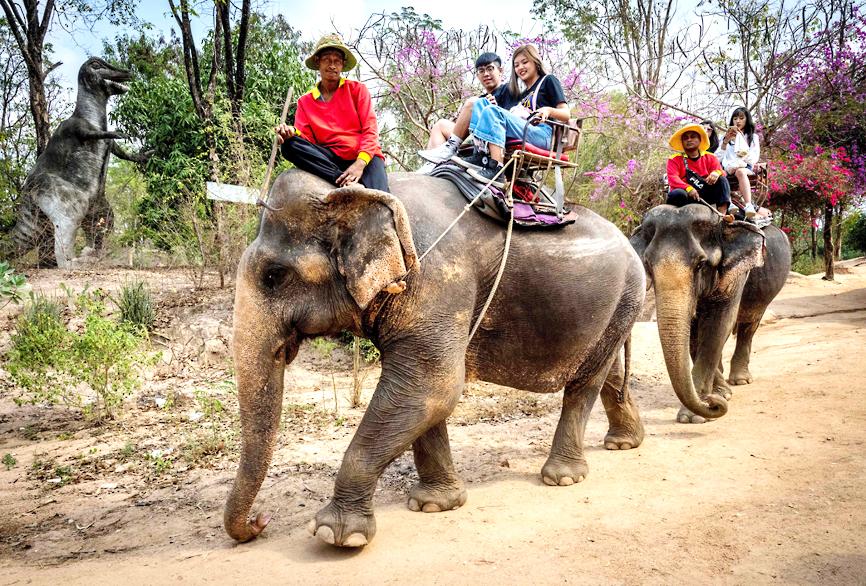Underfed and chained up for endless hours, many elephants working in Thailand’s tourism sector could starve, be sold to zoos or be shifted into the illegal logging trade, campaigners warned, as the COVID-19 pandemic leads to a slump in the number of visitors.
Before the coronavirus, life for the kingdom’s estimated 2,000 elephants working in tourism was already stressful, with abusive methods often used to “break them” into giving rides and performing tricks at money-spinning animal shows.
With global travel paralyzed the animals are unable to pay their way, including the 300kg of food a day a captive elephant needs to survive.

Photo: AFP
Elephant camps and conservationists warned that hunger and the threat of renewed exploitation lie ahead, without an urgent bailout.
“My boss is doing what he can, but we have no money,” Kosin, a mahout — or elephant handler — said of the Chiang Mai camp where his elephant, Ekkasit, is living on a restricted diet.
Chiang Mai is Thailand’s northern tourist hub, an area of rolling hills dotted by elephant camps and sanctuaries ranging from the exploitative to the humane.
Footage from another camp in the area showed lines of elephants tethered by a foot to wooden poles, some visibly distressed, rocking their heads back and forth.
About 2,000 elephants are “unemployed” as the coronavirus eviscerates the tourist industry, Thai Elephant Alliance Association president Theerapat Trungprakan said.
A lack of cash is limiting the fibrous food available to the elephants, “which will have a physical effect,” he said.
Wages for the mahouts who look after them have dropped by 70 percent.
Theerapat fears the elephants could soon be used in illegal logging activities along the Thailand-Myanmar border — in breach of a 30-year-old law banning the use of elephants to transport wood.
Others “could be forced [to beg] on the streets,” he said.
It is yet another twist in the saga of the exploitation of elephants, which animal rights campaigners have long been fighting to protect from the abusive tourism industry.
Chinese visitors, who make up the majority of Thailand’s 40 million tourists per year, plunged by more than 80 percent in February.
By last month, the travel restrictions had extended to Western nations.
With elephants increasingly malnourished due to the loss of income, the situation is “at a crisis point,” Elephant Nature Park owner Saengduean Chailert said.
Her sanctuary for about 80 rescued elephants only allows visitors to observe the creatures, a philosophy at odds with venues that have them performing tricks and offering rides.
She has organized a fund to feed elephants and help mahouts in almost 50 camps nationwide, fearing the only options would soon be limited to zoos, starvation or logging work.
For those restrained by short chains all day, the stress could lead to fights breaking out, said Saengduean, of camps that can no longer afford medical treatment for their elephants.
Calls are mounting for the Thai government to fund stricken camps to ensure the welfare of elephants.
“We need 1,000 baht [US$30] a day for each elephant,” Elephant Rescue Park manager Apichet Duangdee said.
Freeing his eight mammals rescued from circuses and loggers into the forests is out of the question, as they would likely be killed in territorial fights with wild elephants.
He is planning to take out a 2 million baht loan to keep his elephants fed.
“I will not abandon them,” he said.

A new online voting system aimed at boosting turnout among the Philippines’ millions of overseas workers ahead of Monday’s mid-term elections has been marked by confusion and fears of disenfranchisement. Thousands of overseas Filipino workers have already cast their ballots in the race dominated by a bitter feud between President Ferdinand Marcos Jr and his impeached vice president, Sara Duterte. While official turnout figures are not yet publicly available, data from the Philippine Commission on Elections (COMELEC) showed that at least 134,000 of the 1.22 million registered overseas voters have signed up for the new online system, which opened on April 13. However,

ALLIES: Calling Putin his ‘old friend,’ Xi said Beijing stood alongside Russia ‘in the face of the international counter-current of unilateralism and hegemonic bullying’ Chinese President Xi Jinping (習近平) yesterday was in Moscow for a state visit ahead of the Kremlin’s grand Victory Day celebrations, as Ukraine accused Russia’s army of launching air strikes just hours into a supposed truce. More than 20 foreign leaders were in Russia to attend a vast military parade today marking 80 years since the defeat of Nazi Germany in World War II, taking place three years into Russia’s offensive in Ukraine. Putin ordered troops into Ukraine in February 2022 and has marshaled the memory of Soviet victory against Nazi Germany to justify his campaign and rally society behind the offensive,

CONFLICTING REPORTS: Beijing said it was ‘not familiar with the matter’ when asked if Chinese jets were used in the conflict, after Pakistan’s foreign minister said they were The Pakistan Army yesterday said it shot down 25 Indian drones, a day after the worst violence between the nuclear-armed rivals in two decades. Pakistani Prime Minister Shehbaz Sharif vowed to retaliate after India launched deadly missile strikes on Wednesday morning, escalating days of gunfire along their border. At least 45 deaths were reported from both sides following Wednesday’s violence, including children. Pakistan’s military said in a statement yesterday that it had “so far shot down 25 Israeli-made Harop drones” at multiple location across the country. “Last night, India showed another act of aggression by sending drones to multiple locations,” Pakistan military spokesman Ahmed

US President Donald Trump on Wednesday said that he would make a decision about how the US government would refer to the body of water commonly known as the Persian Gulf when he visits Arab states next week. Trump told reporters at the White House that he expects his hosts in Saudi Arabia, Qatar and the United Arab Emirates will ask him about the US officially calling the waterway the Arabian Gulf or Gulf of Arabia. “They’re going to ask me about that when I get there, and I’ll have to make a decision,” Trump said. “I don’t want to hurt anybody’s